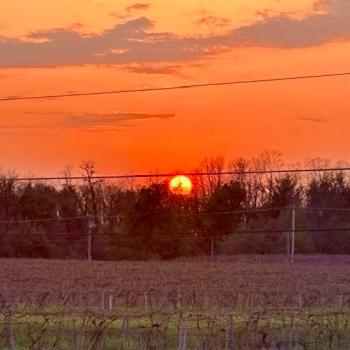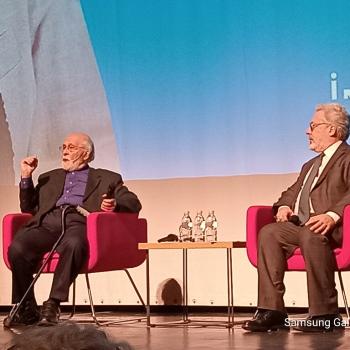I first learned about honoring city spirits when I was traveling abroad. Sometimes I suppose that's what has to happen: we end up going somewhere different to see what's right under our noses every day! This week's column talks about how one can learn to honor city spirits, and some useful things to keep in mind while traveling. Let's begin with how to maintain a spiritual connection while traveling.
The most important item that I carried with me throughout my sojourn in Berlin and my travels elsewhere in Europe was my travel altar. Creating a travel altar is a devotional act and meditation in and of itself. Travel altars can be as individually unique as the person creating them. Mine started out as a stationery box. I bought a set of Japanese greeting cards because I wanted the pretty box to use as an altar container. To that I added various images and small objects from my main altar that symbolized the Gods I love and also a few pictures of my ancestors.
I was later gifted with an altar cloth and, of course, I included a small portable candle. It was simplicity itself, but when traveling in a foreign country for an extended period of time, spending time in strange hotels, it really helped to have the stability and comfort of my altar (albeit in miniature) to turn to. To my finished travel altar, I added my northern tradition prayer beads and a tiny set of travel runes. This was the first thing I set up upon arriving at my student apartment and the last thing I took down.
To make your own travel altar, first find a small, portable box that you like. Cigar boxes are ideal and can of course be decorated by anyone possessing more arts and craft skill than I have (which is almost everyone!). I once saw a cigar box that had been padded and covered in lovely paper, satin lined, and altered to include a small drawer. It was amazing. I have also seen altars in small Altoids tins. The size and contents are completely open to your own imagination.
Once you have your box, decide upon a representational image of the God and/or Goddess with which you resonate most strongly. It can be a statue, if you can find one small enough, or a picture or a stone, or anything that fits in the box that speaks to you of that Deity. Then perhaps add elemental symbols: incense, feathers, stones, sacred oil, earth, a candle, etc. (if that is part of your practice). I also chose to add two pieces of driftwood for my ancestors. In Norse cosmology, humans were first created by Odin, Hoenir, and Lodhur out of two pieces of driftwood, so for me, this symbolizes my ancestors. But including pictures of specific ancestors is an excellent idea as well. Add whatever you like to make this a working altar.
I also suggest taking a journal with you. Traveling in a foreign country, particularly if the Gods and Goddesses you honor have a history of worship in that particular country, can be a powerfully different way of connecting to those Deities. It can teach you things about your Gods and about connecting to Them that can be quite surprising. It's a chance to see a different side to your Deities and to expand your comfort zone a little bit. Keeping a journal of prayers, meditations, insights, and experiences while traveling can both be enlightening and provide a valuable "souvenir" to take home with you. It's an opportunity to bring sacred mindfulness into even the most mundane of journeys. Try to set aside time nightly to write about your day and then see what experiences and insights that day may have brought.
If you are traveling to an area that forms part of your ancestral map, then you have another wonderful opportunity to both honor and reconnect with your dead. Make offerings to your ancestors, even if only a glass of water set upon your altar. Take the time to re-establish your relationship with them, to invite them to come into your life again. If you have the opportunity to visit the towns and villages that your ancestors came from, all the better, but if not, the experience can still be immensely rewarding. Most of all, seek out sacred sites. Sometimes these places are sacred for a reason and they can be powerful points of connection and remembrance.
Of course, one doesn't have to travel abroad to have such a powerful experience with the land, the Gods, or one's ancestors. With the right approach, one can experience just as powerful a connection right in one's hometown. For those of us who work with energy or who practice a religion that believes in honoring the land, I think it is very important to be mindful of the land we inhabit here and now. It's wonderful to honor one's ancestral lands but that doesn't mean we can ignore the place we're living at the moment.
Restoration of our traditions is as much about waking up to what's right in front of your nose as it is about crafting the future or drawing from the wisdom of the past. I think this is something many of us often forget. Connecting with the here and now is as important as connecting with and honoring the ancestors. It's all part of the same devotional act. So, here are a few steps that you can take to learn to honor the spirit of your own city in a mindful, vital, and useful way. It will enrich your practice a thousand times over.
- Learn the folklore of your city. Every city, no matter how young, has its story. Find a good book on your town or city's history. What groups of people settled there? Was there a native presence? Are there places thought to be haunted? Are interesting tales or urban folklore associated with particular spots? What is your own history within your city (i.e., were you born there and if not what drew you to your particular town)? These are all good ways of getting to know the spirit and energy of your hometown, and that is the first step toward incorporating that awareness into your regular work.
- Visit places of interest to you, whether museums or a parks or even specific neighborhoods. Visit those places that have unique or particularly interesting folklore attached to them. Walk around your town or city and try to look at it in a new way: try to map its energy. Really pay attention to the flow of energy as you walk and see how it changes, where it's blocked, what it's like, etc.
- Don't just seek out magical places within your city but try to create your own. Find places that call to you and begin incorporating them into your meditations and ritual work. For instance, I know of a woman who has a special park in NYC, a very small mini-park set up in Morningside Heights. There is no particular folklore surrounding this park save that it was dedicated by the family of a woman who died on the Titanic. There is no history of magic or religious use of this site yet it speaks very strongly to my friend and for her has become a sacred place. She goes there often to meditate and it is her haven when she is exhausted or depressed. She told me once that she feels it's easier to reconnect to the Gods there, when she needs to recharge her awareness of that connection. So don't let yourself be limited to specific places noted in books of folklore. Go out and explore and find your own sacred spots.
- Honor the spirit of your city consciously and consistently. Set out offerings regularly. If there are specific Deities associated with your city, perhaps—if you feel it appropriate—make an offering to them. If there are not, or you don't know those Deities, then just make an offering to the spirit of the city itself. In Norse tradition, vaettir (singular: vaet) are land and nature spirits. The spirit of a city is something like a large vaet. Honor it as an ally just as you might honor spirit allies or ancestors. Develop a working relationship with it and see where that leads. For one of my friends, a devotee of Sigyn and Loki, it led to her becoming seriously involved in environmental work within her town (Monterey, CA). For another, it merely led to him becoming far more comfortable at living in the city as a practicing Pagan and magician. It varies but it can add depth and dimension to your practice either way. Explore how your Gods can manifest, how Their presence can be felt and known in the city. While you're at it, it's a good idea to make regular offerings to the vaettir too. Beer and bread are good, as are milk and honey; and in the New World, they often like tobacco. The important thing to remember is that being Earth oriented is a temporal thing. It's about the here and now as much as it may be about the past. We need both sides of that equation for balance.
- The other thing you can do has more of a connection to ancestral veneration than it does to the magic of city living. When I was first visiting Hela's Pond in Berlin, I stopped in to see the cemetery that is right next to it. I had quite a shock. German cemeteries, or at least this German cemetery, are beautiful. It looked like a nature park. The graves were not only well tended, but there was the palpable sense that these dead were honored in their own way, that they remained vital members of their families. People visited them and took care of their graves beautifully and in so doing honored and fed the spirit. It was a startling contrast to most American cemeteries that I have seen. There is a saying in Lukumi that we stand on the shoulders of our ancestors. Therefore, honoring our ancestors should be a vital and valued part of any spiritual practice. Go to a local cemetery. Walk around and read the names on the headstones. Pour out offerings of water or beer. Clean up if the cemetery has trash in it or is dilapidated. Bring offerings to the dead, even if they are not your dead and do so in the name of your own ancestors. Bring flowers, incense, alcohol—whatever you feel is appropriate (in American cemeteries, flowers are the most common gift to the dead) but extend a bit of care to the dead and consider making this an ongoing part of your devotional practice. Your own dead will thank you for it.
- Finally, consider making a public shrine to the city spirit. This does not have to be obnoxious and overly obvious. Find a place and set out offerings, clean it up, make it holy in some small way and maintain it. This may be a foot of space on your apartment rooftop. It may be the base of a tree in the local woods or park. It may be a section of alleyway.





